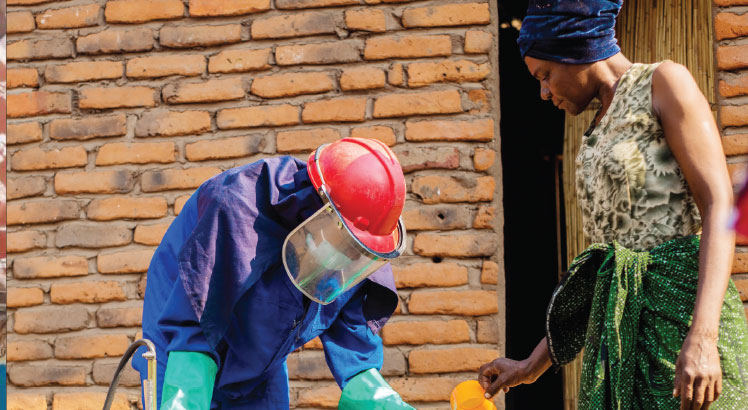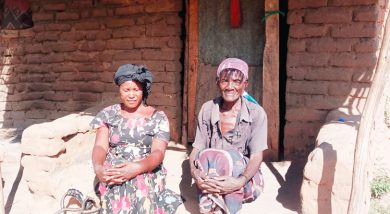Making Mangochi malaria-free
Catherine Winesi, 48, is delighted that her family of six has clocked four years without suffering from malaria.
Before 2019, the woman from Chisumbi Village, Traditional Authority (T/A) Chimwala in Mangochi, says the disease used to disrupt all aspects of her family’s life.
“My four children used to get sick one after the other,” she recalls. “They were bedridden for days or weeks and this affected their education. We usually spent our little income on frequent hospital trips and stays.”
Winesi says the disease also affected their productivity. She and her husband often stopped doing piecework as they had to care for sick children.
According to the 2019 Health Management Information System, malaria has grave socio-economic impacts, including school absenteeism, loss of productive hours and high expenditures for prevention and treatment.
As prevalence rate of malaria swells in the country during rainy months from November to April, Mangochi and other lakeshore districts have the highest disease burden.

District malaria coordinator Lamusi Abudu says Mangochi District Hospital and its 48 health centres are overwhelmed by malaria patients.
Violet Selemani, senior health surveillance assistant in T/A Chimwala, says Ukalanga Health Centre alone was treating 1 500 malaria patients a month.
“The disease, comared to others, used to kill more people since they failed to get full treatment as the facility frequently runs out of drugs,” she says.
Severe malaria observatory reports that about 7.4 percent of all malaria cases in the eastern and southern Africa occur in Malawi, which registers six million cases annually.
In 2020, the country treated about seven million malaria patients of whom 2.5 million plus were children aged below five.
The Ministry of Health reports that this resulted in 2 551 deaths.
According to official figures, the disease transmitted by female anopheles mosquito claims six lives every day nationwide.
As the rainy season kicks in, Winesi is certain that her family will go a fifth year without malaria. She says they are safe from infective mosquito bites. In 2019, her home was sprayed with chemicals that either repel or kill mosquitoes.
The mother of four says indoor residual spraying (IRS), conducted by World Vision Malawi in partnership with the Ministry of Health, has reduced the population of mosquitoes likely to spread the disease.
The vector control intervention is financed by the Global Fund. Skilled workers, clad in overalls, spray insecticide to internal walls and ceilings of dwelling structures.
The intervention targets 341 792 houses to safeguard lives of over 1.2 million people from malaria.
Winesi always looks forward to the arrival of the seasonal workers armed with sprayers because IRS has improved her family’s health and well-being.
“We have peace of mind as the environment is safe from mosquitoes. Instead of being stuck to the sickbed or wasting money on hospital visits, I save more time to take care of my home. Now children go to school as required and grow into their full potential. Besides, my husband focuses on income generating activities to provide for the family,” she says smilingly.
Group village head Mtenje says the IRS initiative has brought smiles and a huge relief to his community.
“As malaria is becoming history, people here are healthy,” says the traditional leader. “This has given us more time to do productive work to curb household poverty and hunger,” he says.
In 2021, Mangochi beat the National Malaria Control Programme target to halve the caseload from 386 patients to 193 per 1 000 people by 2022. It reduced the count to 183 per 1 000 people.
“We also have few admissions in hospitals to the extent that there is more malaria drug, Artemether Lumefantrine (LA). Malaria deaths have also been reduced by 60 percent,” says the clinical officer also responsible for the district hospital’s maternity wing.
Mangochi district commissioner Raphael Piringu commends the project for complementing their efforts to combat malaria in the district.
“The disease burden on pregnant women and under-five children has gone down. We are happy as the situation is key to our sustainable health and development,” he says.
World Vision district coordinator Confidence Mkungula says the faith-based nongovernmental organisation strives to create safe communities for all, especially children.
She says: “We work towards achieving Sustainable Development Goal (SDG) 3 to ensure healthy lives and promote well-being for all at all ages. We are pleased with strides registered so far to make the district malaria-free.”
World Vision also conducts social behaviour change activities to improve the adoption of malaria prevention approaches in areas where resistance persists due to cultural and religious beliefs, myths and misconceptions.
The project employs over 5 000 seasonal workers, whom the majority are youths.






One Comment